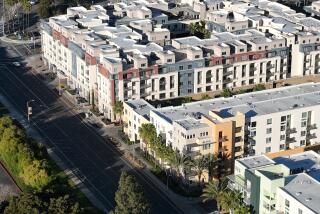First step: Check out local building codes
It’s an appealing idea: Order a prefabricated steel building, have it shipped to your home, bolt it together with a few buddies over a weekend -- and save over traditional construction. Many people have purchased a garage, barn or workshop from one of the nation’s numerous sellers of such buy-and-build products with this scenario in mind.
But, says John Knight, founder of Santa Clarita-based Knight Building Systems, some Southlanders end up disappointed.
Knight says he fields frantic calls several times a year from homeowners who have purchased plans for a pre-engineered building or materials from an out-of-state steel building manufacturer only to have those plans fail to meet state, county or city codes and seismic requirements -- or to have the building never arrive.
Knight has seen some recurring scenarios. A company may tell the buyer that there was a special on a pre-engineered building that someone ordered and didn’t take delivery of, he said. “But in most of the projects that we have taken over to help clients with, we confirmed that no building was sitting waiting.”
Castaic do-it-yourselfer James Perry, 53, spent about $30,000 on a workshop ordered from out of state but had second thoughts after checking with friends and other companies about statements made by the manufacturer.
Perry, who put the building on his American Express card, canceled the order and eventually got his money back. But he doesn’t recommend buying a metal building from out of state or over the phone.
“It got real nasty,” he said. “I had to get my lawyer involved.”
Unlike Perry, Santa Clarita software engineer Ken Abbott, 58, never got his money back after his out-of-state prefab purchase went awry.
“I paid $2,000 for the plans, and they were no good,” Abbott said. “Not to code.”
“The permitting and design issues are where people get stung,” Knight said.
Even if the company guarantees that your plans will pass city checks, Robert C. Steinbach, assistant chief of the inspection bureau for the city of Los Angeles Department of Building and Safety, advises that you don’t order a building until you have received plans and gone through a permit plan check approval with the city or met with a city plan checker to confirm and discuss requirements for your specific project.
California has one of the toughest building codes in the country, according to Steinbach, who recommended finding a local, licensed steel manufacturer who is approved by your city building department and will be nearby in case you need replacement panels or parts.
“Metal buildings require specific manufacturing specifications and approval. To be used in the city of L.A., the products must have an L.A. city research report, the engineers designing the building must be licensed in the state of California, and the prefabricated framing members must be manufactured in a city of L.A. licensed fabrication facility,” Steinbach said.
Consumers can find a list of fabricators approved by L.A. city at ladbs.org/lic_apprvd_prod/fabricator_roster.pdf.
Taking the plunge? Read the fine print in your contract before you sign or pay.
And find out how the firm will remedy any missing or damaged parts. Most companies won’t replace a missing or damaged part unless immediately notified by the receiving party, so examine the materials when they arrive.


